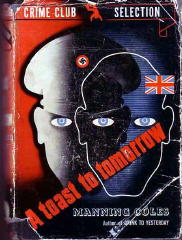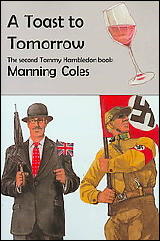Thu 26 Mar 2009
A 1001 MIDNIGHTS review: MANNING COLES – A Toast to Tomorrow.
Posted by Steve under 1001 Midnights , Reviews[3] Comments
by Newell Dunlap:
MANNING COLES – A Toast to Tomorrow.

Doubleday Crime Club, US, hardcover, 1941. Earlier UK edition, published as Pray Silence: Hodder, hc, 1940. Many reprint editions, both hardcover and soft. US paperback editions include: Bantam 118, 1947; Berkley F873, Jan 1964; Rue Morgue Press, 2008.
In Germany in March 1933, a bit of a puzzle crops up concerning a radio production called “The Radio Operator.” On the surface, the show is nothing more than blatant Nazi propaganda. But to the British Foreign Office, it is much more.
It seems the Morse code used as a background sound on the. show is actually a code used by an undercover British agent during World War I. Why, then, is it suddenly being used again after all these years-especially since the agent who used it is now dead? A puzzle indeed.
For answers, the novel flashes back to January 1918, and we follow the life of an amnesia victim who adopts the name Klaus Lehmann. Lehmann, like most Germans, has a rough time of it in the postwar years.
He meets Adolf Hitler, joins the Nazi party, and works his way up through the party ranks, all this before he remembers his true identity. He is really Hendrik Brandt. No, that isn’t right. He is really a British intelligence agent named Tommy Hambledon, who was posing as Brandt, and who is now posing as Lehmann. And what a position for a British agent to be in!

The name Manning Coles is a pseudonym for Cyril Coles and Adelaide Manning. Under this pseudonym they produced numerous books and stories, but none of their characters was more popular than agent Hambledon. This book is the second in the Hambledon series. In the first, Drink to Yesterday (1941), Hambledon winds up his World War I experience and suffers the beginning of amnesia.
The subsequent books — among them Operation Manhunt (1954), The Man in the Green Hat (1955), and The House at Pluck’s Gutter (1968) — came to rely more and more on formulaic plots and stock settings, and from the Fifties on,the series lost much of its appeal.
Coles and Manning also collaborated on a series of satirical ghost stories featuring a defunct pair of cousins, James and Charles Latimer, and their equally dead pet monkey, Ulysses. Published as by Francis Gaite, these include Brief Candles (1954), The Far Traveler (1956), and Duty Free (1959).
———
Reprinted with permission from 1001 Midnights, edited by Bill Pronzini & Marcia Muller and published by The Battered Silicon Dispatch Box, 2007. Copyright © 1986, 2007 by the Pronzini-Muller Family Trust.
March 26th, 2009 at 10:50 pm
I always enjoyed the Manning Coles books featuring Tommy Hambledon, especially the later ones where their sense of humor took the fore. True, sometimes the antics of Hambledon’s two cronies grew a bit tiresome, but the books were always entertaining and enjoyable. I would particularly reccommend Alias Uncle Hugo and The Basle Express from the later books, though most of them are at least enjoyable. The only short Hambledon story I know of is often anthologised and finds Hambledon in England on the hunt for a very special Nazi war criminal.
Despite that I would agree that none of the later Hambledon’s quite come up to the premice of the first two, especially A Drink to Yesterday which ends with something of a cliffhanger and on a downbeat.
March 26th, 2009 at 11:29 pm
David
There’s nothing in what you say about the stories themselves that I disagree with. For a pair of two other Hambledon adventures I’ve talked about on this blog myself, see my review of No Entry (1958) at https://mysteryfile.com/blog/?p=269, and one of Let the Tiger Die (1947) at https://mysteryfile.com/blog/?p=1003.
The book Nothing to Declare, though, is an entire collection of Hambledon short stories. See the discussion between Keith Chapman and myself following the Tiger review. According to Wikipedia, there is one uncollected Manning Coles story, “Death Keeps a Secret,” (in The Mystery Bedside Book, 1960, edited by John Creasey). I don’t know if this is a Hambledon story, but if it is, perhaps that’s the one you’re thinking of?
— Steve
March 27th, 2009 at 5:50 pm
I really enjoyed some of the Tommy Hambledon books as a kid, especially Drink to Yesterday, A Toast to Tomorrow, and Green Hazard. And elderly neighbors used to take us kids to the library sometimes. Once they recommended Brief Candles, which was fun too.
Have never read any of the Coles’ short stories.